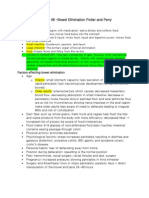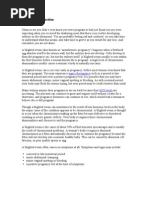Solution Focussed Approach
Solution Focussed Approach
Uploaded by
08brad02Copyright:
Available Formats
Solution Focussed Approach
Solution Focussed Approach
Uploaded by
08brad02Copyright
Available Formats
Share this document
Did you find this document useful?
Is this content inappropriate?
Copyright:
Available Formats
Solution Focussed Approach
Solution Focussed Approach
Uploaded by
08brad02Copyright:
Available Formats
Introduction
to
Solution Focused Practice
www.johnwheeler.co.uk
Where it came from*
The Solution-focused approach was developed
in the 1980s by Steve de Shazer and Insoo Kim
Berg of the Brief Family Centre in Milwaukee,
USA.
They modified existing Brief Therapy,
keeping only those elements which were
linked to a good outcome for the clients.
Slides 2-5 adapted from Alasdair MacDonalds website
www.solutionsdoc.co.uk
www.johnwheeler.co.uk
Central assumptions
The goals for the work are chosen by the service
user
Service users have resources which they will bring
to the work.
A detailed history is not essential for a Solution-
focused conversation to arrive at solutions.
Problem talk and speculation about motives or
purposes of symptoms are avoided.
The practitioner adopts the service users
vocabulary and tracks their use of language.
www.johnwheeler.co.uk
Overview of SF tools
Goals are defined in practical and recognisable
ways.
Talk about pre-session changes, exceptions,
scaling tasks and the miracle question keeps the
focus on effective solutions.
Homework tasks are offered to continue the
process of change between sessions.
Individuals, couples or families may be seen; joint
sessions are common even if one individual is the
main focus.
www.johnwheeler.co.uk
Research
An important research finding is that Solution
Focused Practice is equally effective for all
social classes whereas many other
psychological approaches favour the well-
educated and affluent. In practice those with
few resources are the ones most in need of
effective help.
Another advantage is that results are usually
achieved within 3 6 sessions.
www.johnwheeler.co.uk
Small group discussion
What, so far, has
caught your
interest as a Social
Worker?
What, so far, has
you thinking that
a Solution
Focused approach
might help you
help the people
you work with??
www.johnwheeler.co.uk
Future focus
Presence of whats wanted rather than the absence
of something that isnt. You can only measure whats
happening.
Dont assume you know what the service user means
What would that look like?
How could other people tell it was happening?
Why is this important to you?
Goals/Best Hopes/Preferred Future
www.johnwheeler.co.uk
Here is a sampling of the
kinds of conversations that I
have observed around goals,
best hopes, and preferred
futures with the current
group I'm working with -
homeless military veterans,
many of whom have gotten
into a mess with drugs or
alcohol, losing jobs, getting
physically ill, even sleeping
outside or in very rough
conditions.
Dvorah Simon. U.S. 2014
www.johnwheeler.co.uk
"What are your goals?" (a question that I am required to ask by the agency I work for)
- I want to get sober
- I want to get a decent place to live
- I want to help for my PTSD
- I don't want to go to jail
"What are your best hopes for our work together?"
- I'll understand why I drink.
- I'll get into that housing program.
- I'll get vocational counseling.
Preferred future questions such as, "Suppose you complete this program and it's two
years from now and you are living the life you want to be living. What will it look
like?"
- I'll have a nice apartment and my kids will be able to visit me.
- I'll be going to college and getting an anthropology degree.
- I'll have a plot of land and I want to build a tiny house. I'm researching all the
neat ways of doing that now!
- I will be selling tamales out of a food truck. My sister makes them and they are
delicious!
www.johnwheeler.co.uk
I think each of these kinds of conversations can be
useful but for what I've been doing, the preferred
future questions often seem to provoke far richer,
imaginative, and individualized responses. Also for
people who have been through a lot of "programs",
the goals answers can often be things they think or
have been told they should want.
www.johnwheeler.co.uk
I learned this years ago with a woman who came to me with such severe anorexia that
between the time she called me and our first appointment, she had to spend 2 weeks in a
hospital so she wouldn't die of starvation. When I asked her what her goals were for our
work together, she said a very reasonable thing: "I need to learn how to eat normally." She
then went on to tell me all the therapies she had tried hadn't worked! So she knew that
"eating normally" was what she SHOULD want but had a kind of despair about whether
that would ever be achievable.
When I asked the miracle question, the most wonderfully different answer came out. "I
see myself going to the theatre with friends." We then had a long and detailed
conversation about what sort of theatre she enjoys, and how she would like to enjoy going
to it. Finally I asked what connection there might be with going to theatre and her eating,
and she said, "because after the show we all go out to eat, and right now I'm afraid of
being too weird, so I just don't go." Her love of theatre gave us something she WANTED to
work with, around which the (very real) eating issues could be attended to. It also gave ME
a beautiful sense of "there's a living, breathing, imagining, yearning person in there" which
helped me overcome my initial fear of working with someone who looked pretty scarily
vulnerable.
www.johnwheeler.co.uk
Discussion in pairs
Suppose everything
works out well, and in
a few months you are a
professionally qualified
Social Worker.
How would you be able to tell that you were
doing a good job?
How would your service users be able to tell
that you are doing a good job?
How would your colleagues be able to tell that
you are doing a good job? www.johnwheeler.co.uk
Scaling questions
10
0
The Social Worker you
imagine yourself being.
No evidence at all
? NOW
How can you tell its this
number and not lower?
www.johnwheeler.co.uk
Scaling continued
Add 1 to the number
How would this be different from how it is at
the moment?
www.johnwheeler.co.uk
General wellbeing.
Progress towards goals.
Pre-meeting change.
Identify coping strategies.
Relapse prevention.
Safety.
Scaling questions
10
0
n
Where you want to
get to
As bad as it could be
Current
evaluation
One step
closer to 10
www.johnwheeler.co.uk
Using scales on placement
www.johnwheeler.co.uk
Who might it be
useful to use
scaling questions
with on your
placement, and
how in particular?
Solution talk vs. problem talk
Gassmann, D. &
Grawe, K. (2006) General change mechanisms: the relation
between problem activation and resource activation in successful and unsuccessful
therapeutic interactions. Clinical Psychology & Psychotherapy. 13. 1: 1-11.
Best outcomes correlated to interviews where
interviewer mainly focused on resource
activation
Poorest outcomes correlated to interviews
where interviewer mainly focused on problem
activation
www.johnwheeler.co.uk
What we think about our service users
Flckiger, C. and Grosse Holtforth, M. (2008), Focusing the therapist's
attention on the patient's strengths: a preliminary study to foster a
mechanism of change in outpatient psychotherapy. Journal of Clinical
Psychology, 64: 876890.
When practitioners thought about their
clients strengths for ten minutes before they
saw them there were better outcomes when
compared to a control group of practitioners
who didnt
www.johnwheeler.co.uk
Binocular vision
++++++
+++
- - - - - -
- - - -
www.johnwheeler.co.uk
++++++
+++
- - - - - -
- - - -
Support
www.johnwheeler.co.uk
Assessment
++++++
+++
- - - - - -
- - - -
www.johnwheeler.co.uk
Intervention
++++++
+++
- - - - - -
- - - -
www.johnwheeler.co.uk
PROBLEM
www.johnwheeler.co.uk
PROBLEM
EXCEP-
TIONS
EXCEP-
TIONS
EXCEP-
TIONS
EXCEP-
TIONS
EXCEP-
TIONS
www.johnwheeler.co.uk
Potential ways of finding exceptions
Tell me about times when this problem isnt
quite so bad, or doesnt happen at all? What are
you or others doing differently at those times
which might help to explain this?
Can you think of a time in the past when youve
had some success dealing with this issue?
Can you think of another issue which youve
managed to deal with in the past which is a bit
like this one?
LISTEN
www.johnwheeler.co.uk
Exceptions on placement
What are the issues that are going on in the
lives of the service users you are working with
where there are likely to be exceptions?
www.johnwheeler.co.uk
Miracle question
Suppose, when you go to bed tonight, a
miracle happens, and the problems you
have at the moment are resolved, but
because you are asleep you dont know.
When you wake tomorrow, what will be the
first sign the miracle has happened?
www.johnwheeler.co.uk
Exercise in pairs
Suppose between now and the next time you are on
placement a Miracle happens and the miracle makes the
placement experience exactly right for you.
What would be a first sign to you that such a miracle had
happened on your placement?
What would other people notice was different about you
because of this?
What would you do more of or differently because the
miracle had happened?
What would please you most about the placement because
the miracle had happened?
www.johnwheeler.co.uk
4 reasons for asking the Miracle
Question
Harry Korman (2007) More than Miracles. Pp 40-41. Haworth Press
One way to create goals
The Miracle question as a virtual miracle, an
emotional experience
Prepares for exceptions
-> ask about exceptions
Part of creating a progressive story
-> scaling
www.solutionfocusedtrainers.co.uk
www.johnwheeler.co.uk
What are you most likely to
take away from today?
What difference do you
hope that will make to your
work with service users?
You might also like
- Systemic Ethics TextbookFrom EverandSystemic Ethics TextbookKristina S BrownNo ratings yet
- Philosophy. The Quest For The TruthDocument670 pagesPhilosophy. The Quest For The Truth08brad02100% (8)
- Davila and Maturana (2023) Cultural-Biology Our Human Living in Conversations and ReflectionDocument12 pagesDavila and Maturana (2023) Cultural-Biology Our Human Living in Conversations and ReflectionMarcos FreitasNo ratings yet
- What Is Integrative PsychotherapyDocument2 pagesWhat Is Integrative PsychotherapyAnonymous xce0hyz0Z1No ratings yet
- Scored Patient Generated Subjective Global Assessment PG SGA PDFDocument2 pagesScored Patient Generated Subjective Global Assessment PG SGA PDFSognotNo ratings yet
- Multiple Minorities As Multiply Marginalized: Applying The Minority Stress Theory To LGBTQ People of ColorDocument22 pagesMultiple Minorities As Multiply Marginalized: Applying The Minority Stress Theory To LGBTQ People of ColorVincent Jeymz Kzen VillaverdeNo ratings yet
- Just Therapy: Warihi Campbell, Kiwi Tamasese & Charles Waldegrave (The Family Centre)Document5 pagesJust Therapy: Warihi Campbell, Kiwi Tamasese & Charles Waldegrave (The Family Centre)sun angela100% (1)
- ADP Interview Question AnswersDocument3 pagesADP Interview Question AnswersPola DeepuNo ratings yet
- 2 - Grazebrook, K & Garland, A. (2005) - What Are Cognitive and - Orbehavioural Psychotherapies - Paper Prepared For UKCP - BACP PDFDocument5 pages2 - Grazebrook, K & Garland, A. (2005) - What Are Cognitive and - Orbehavioural Psychotherapies - Paper Prepared For UKCP - BACP PDFAnastasiya PlohihNo ratings yet
- School Made Much Easier V2.2Document119 pagesSchool Made Much Easier V2.2Iqbal Pugar Ramadhan100% (1)
- Health Reslience Lesson Plan - 2 X 45 Minute LessonsDocument3 pagesHealth Reslience Lesson Plan - 2 X 45 Minute Lessonsapi-330742087No ratings yet
- Biology ProjectDocument12 pagesBiology Projectapi-380313126100% (2)
- Fundamentals of Nursing Outline Chapter 46 Potter and PerryDocument6 pagesFundamentals of Nursing Outline Chapter 46 Potter and PerryAidenhunter05100% (6)
- The Learning Circle in Culture Change: Why Use It?: SourcesDocument6 pagesThe Learning Circle in Culture Change: Why Use It?: SourcesElliot Randolph SavageNo ratings yet
- Philosophy of Supervision-Draft 3Document18 pagesPhilosophy of Supervision-Draft 3api-302812780100% (1)
- Transpersonal Efforts 1Document22 pagesTranspersonal Efforts 1mariana henteaNo ratings yet
- Attunement and Involvement (PDFDrive)Document27 pagesAttunement and Involvement (PDFDrive)Dangsinen SarangheyoNo ratings yet
- Research Paper: Prochaska's Transtheoretical Model of Change and Its Application To CoachingDocument12 pagesResearch Paper: Prochaska's Transtheoretical Model of Change and Its Application To CoachingInternational Coach AcademyNo ratings yet
- Meditation For PeaceDocument7 pagesMeditation For Peaceapi-350918871No ratings yet
- Gestalt Peeling The Onion Csi Presentatin March 12 2011Document6 pagesGestalt Peeling The Onion Csi Presentatin March 12 2011Adriana Bogdanovska ToskicNo ratings yet
- Working With Victims: Being Empathic HelpersDocument12 pagesWorking With Victims: Being Empathic HelpersАнтон ГромовNo ratings yet
- Outsider-Witness Practices: Some Answers To Commonly Asked QuestionsDocument22 pagesOutsider-Witness Practices: Some Answers To Commonly Asked Questionssun angelaNo ratings yet
- Clinician BurnoutDocument7 pagesClinician Burnoutfgump123No ratings yet
- Vipassana 2Document11 pagesVipassana 2Anonymous Hq7gnMx7No ratings yet
- Trans Safe Zone Training Facilitation GuideDocument44 pagesTrans Safe Zone Training Facilitation Guideapi-384670606100% (1)
- Role of Attitude in Multicultural Counseling - Minami (2009)Document8 pagesRole of Attitude in Multicultural Counseling - Minami (2009)xiejie22590No ratings yet
- Psychotherapy Biodynamic Body Psychotherapy & Counselling: The 'Primary Personality'Document10 pagesPsychotherapy Biodynamic Body Psychotherapy & Counselling: The 'Primary Personality'carlesavila2246No ratings yet
- Psychotherapy East and WestDocument7 pagesPsychotherapy East and Westbde_gnasNo ratings yet
- The Core Techniques of Morenian Psychodrama: A Systematic Review of LiteratureDocument11 pagesThe Core Techniques of Morenian Psychodrama: A Systematic Review of Literaturegirish.nara4967No ratings yet
- Cognitive Theories of Learning: Gestalt Theory and Field TheoryDocument35 pagesCognitive Theories of Learning: Gestalt Theory and Field TheoryGene RamosNo ratings yet
- Contact Interruptions (2003)Document16 pagesContact Interruptions (2003)Антон Громов100% (1)
- Gestalt Couples Therapy BGJ PDFDocument10 pagesGestalt Couples Therapy BGJ PDFamaac82No ratings yet
- Art. 1 One To One PsychodramaDocument8 pagesArt. 1 One To One PsychodramaTamara Cavic100% (1)
- Environmental Trauma, Resiliency and Activism: Finding A Personal Healing Process Through Community EngagementDocument26 pagesEnvironmental Trauma, Resiliency and Activism: Finding A Personal Healing Process Through Community EngagementKat Dunn100% (1)
- Home Study Course 200903Document59 pagesHome Study Course 200903inetwork2001No ratings yet
- Carl RogersDocument2 pagesCarl RogersAndrew BuckNo ratings yet
- Avoiding Burnout and Severe Stress: Guidelines For The Helping ProfessionalsDocument44 pagesAvoiding Burnout and Severe Stress: Guidelines For The Helping ProfessionalsChiriac Ionut Ilie100% (1)
- A Dynamic Group For The ElderlyDocument12 pagesA Dynamic Group For The ElderlyjuaromerNo ratings yet
- Therapist Self-Disclosure: Research-Based Suggestions For PractitionersDocument11 pagesTherapist Self-Disclosure: Research-Based Suggestions For PractitionerslizleeasNo ratings yet
- Compassionate Systems Professional Growth ModelDocument3 pagesCompassionate Systems Professional Growth ModelDave SecombNo ratings yet
- Red Tent Toolkit Final 2018Document16 pagesRed Tent Toolkit Final 2018IlyNo ratings yet
- Hakomi Principles, Part 1Document3 pagesHakomi Principles, Part 1Paul HubbardNo ratings yet
- System Constellations As Tool Supporting OrganisatDocument21 pagesSystem Constellations As Tool Supporting OrganisatbacchanteNo ratings yet
- Psychotherapy. Theory, Research and Practice - E. GendlinDocument12 pagesPsychotherapy. Theory, Research and Practice - E. GendlinCamilo IgnacioNo ratings yet
- CBT Course Supporting NotesDocument20 pagesCBT Course Supporting NotesSushma KaushikNo ratings yet
- CounsellingDocument55 pagesCounsellinghasna.psyyNo ratings yet
- Cultivating Compassion - Key Components of Cognitively Based Compassion Training - Brooke Dudson - Lavelle & Tim HarrisonDocument13 pagesCultivating Compassion - Key Components of Cognitively Based Compassion Training - Brooke Dudson - Lavelle & Tim Harrisonccareemail100% (1)
- Empty Chair Nigel P FieldDocument10 pagesEmpty Chair Nigel P FieldMuadz NuruzzamanNo ratings yet
- Applying The Stages of Change John Norcross 1535368885Document6 pagesApplying The Stages of Change John Norcross 1535368885Sara CairesNo ratings yet
- Hakomi - Healing Relationship & Hierarchy of ContextsDocument2 pagesHakomi - Healing Relationship & Hierarchy of ContextsPaul HubbardNo ratings yet
- Attachment Theory ChesterRepDocument28 pagesAttachment Theory ChesterRepmed-psy-01-23No ratings yet
- Mind Your Own Gestalts!Document3 pagesMind Your Own Gestalts!Narcis NagyNo ratings yet
- Klcsgopol 02 Khbps 5 Q 458 ADocument5 pagesKlcsgopol 02 Khbps 5 Q 458 AricardogranadoNo ratings yet
- TP and PVT For Print PDFDocument15 pagesTP and PVT For Print PDFVania Aguilera ArriagadaNo ratings yet
- SE Protocols Yr 1 - Dec 2020, June 2021Document9 pagesSE Protocols Yr 1 - Dec 2020, June 2021kangourasNo ratings yet
- PTMF DCP Training SlidesDocument76 pagesPTMF DCP Training Slidespmj8qfp7c7No ratings yet
- Attention and Working Memory in Mindfulness-Meditation PracticesDocument20 pagesAttention and Working Memory in Mindfulness-Meditation PracticesSu AjaNo ratings yet
- Hakomi Principles, Part 2Document2 pagesHakomi Principles, Part 2Paul Hubbard100% (1)
- Carr (2016) How and Why Do Family and Systemic Therapies WorkDocument19 pagesCarr (2016) How and Why Do Family and Systemic Therapies WorksofiaNo ratings yet
- Therapeutic MethodologyDocument8 pagesTherapeutic MethodologyMohamad Shuhmy ShuibNo ratings yet
- Albright, Jennifer SampleDocument142 pagesAlbright, Jennifer SampleSabitri SanyalNo ratings yet
- Oppression and Power Exercises)Document11 pagesOppression and Power Exercises)hommedeseptilesNo ratings yet
- Walker PHD ThesisDocument185 pagesWalker PHD Thesisttyffany berrospiNo ratings yet
- Multicultural Counseling PortfolioDocument11 pagesMulticultural Counseling Portfolioapi-285240070No ratings yet
- Voice of The ChildDocument4 pagesVoice of The Child08brad02No ratings yet
- The Violence of DisablismDocument17 pagesThe Violence of Disablism08brad02No ratings yet
- Study Guide: John Stuart Mill's EthicsDocument4 pagesStudy Guide: John Stuart Mill's Ethics08brad02No ratings yet
- The Ethics of F.A. HayekDocument71 pagesThe Ethics of F.A. Hayek08brad02No ratings yet
- Central and South East European PoliticsDocument601 pagesCentral and South East European Politics08brad02100% (1)
- Oxymel in Medieval PersiaDocument4 pagesOxymel in Medieval PersiaCurfew Copenhagen100% (1)
- Strategy of InterventionDocument14 pagesStrategy of InterventionParkjoosooNo ratings yet
- The McKenzie Method Powerpoint 2008Document57 pagesThe McKenzie Method Powerpoint 2008Marikit2012No ratings yet
- ROM Strength v2Document13 pagesROM Strength v2Kinzhuy MotageNo ratings yet
- SyncopeDocument5 pagesSyncopeprashanth100% (1)
- IndianJRadiolImaging253288-7172209 195522 (7lmbr)Document8 pagesIndianJRadiolImaging253288-7172209 195522 (7lmbr)Ami WilliamsNo ratings yet
- Norepinephrine Acetylcholine (Ach)Document6 pagesNorepinephrine Acetylcholine (Ach)Jestoni Dulva Maniago100% (5)
- A Cultural-Existential Approach To Therapy Merleau-Ponty's Phenomenology of Embodiment and Its Implications For PracticeDocument22 pagesA Cultural-Existential Approach To Therapy Merleau-Ponty's Phenomenology of Embodiment and Its Implications For Practicerockman22No ratings yet
- Basic Iv Therapy Training Program March 4-6, 2021Document4 pagesBasic Iv Therapy Training Program March 4-6, 2021Mary Rose Silva GargarNo ratings yet
- A Clinically Oriented Comprehensive Pictorial Review of Canine Elbow AnatomyDocument9 pagesA Clinically Oriented Comprehensive Pictorial Review of Canine Elbow AnatomyHospital Veterinário e Pet Shop Dr. HatoNo ratings yet
- Brochure Spa CaudalieDocument19 pagesBrochure Spa CaudalieIsabel ValeNo ratings yet
- Case StudyDocument9 pagesCase StudyChristian San Jose TanNo ratings yet
- My Own Type1 Diabetes BookDocument43 pagesMy Own Type1 Diabetes BookElaineBuchhornNo ratings yet
- Training-Module-MERS - (Manual Reporting)Document23 pagesTraining-Module-MERS - (Manual Reporting)Farmasi KKPDNo ratings yet
- Visual CBTDocument43 pagesVisual CBTCapstone Publishing100% (7)
- Team Motivation FMGE Coaching Academy: Mock Test - 3Document23 pagesTeam Motivation FMGE Coaching Academy: Mock Test - 3abhishiktaNo ratings yet
- Anti DiabeticDocument34 pagesAnti DiabeticEJ GabaoNo ratings yet
- مجموعه من الاسئلة التمريضيةDocument75 pagesمجموعه من الاسئلة التمريضيةأبوأحمد الحكيمNo ratings yet
- Precautions in Handling of Three-Way Stopcocks: No. 48 January 2016Document4 pagesPrecautions in Handling of Three-Way Stopcocks: No. 48 January 2016MOHAMMED IQBALNo ratings yet
- Tewksbury Training BrochureDocument12 pagesTewksbury Training BrochureArslan Ishaq100% (1)
- Psychosocial Impact of Assistive Devices Scale (PIADS) : Technology and Disability January 2002Document6 pagesPsychosocial Impact of Assistive Devices Scale (PIADS) : Technology and Disability January 2002Marta SilvaNo ratings yet
- Tumor MarkersDocument7 pagesTumor Markersiron100% (1)
- Basic ConceptsDocument2 pagesBasic Conceptsvky4jbpyg4No ratings yet
- SP FinalDocument18 pagesSP Finalapi-344954734No ratings yet
- Policy SampleDocument2 pagesPolicy Samplecholofrancisco8No ratings yet
- Wolny 2018Document10 pagesWolny 2018tri cahyani setyowatiNo ratings yet































































































